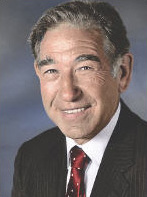Stanley Cohen (biochemist)
Stanley Cohen (November 17, 1922 – February 5, 2020) was an American biochemist and Nobel Laureate in Physiology or Medicine, awarded in 1986 for his discovery of epidermal growth factor (EGF) and its receptor. His groundbreaking work, conducted alongside Rita Levi-Montalcini, has had profound implications for the study of cell growth, development, and cancer research.
Early Life and Education[edit | edit source]
Stanley Cohen was born in Brooklyn, New York, to Jewish immigrants from Russia. He developed an interest in biology at a young age. Cohen attended Brooklyn College, where he earned his B.A. in biochemistry in 1943. He then served as a chemist in the U.S. Army during World War II. After the war, he pursued graduate studies at Oberlin College, receiving his M.A. in zoology in 1948. Cohen completed his Ph.D. in biochemistry at the University of Michigan in 1952, where his research focused on the enzymology of bacterial spores.
Career and Research[edit | edit source]
After completing his Ph.D., Cohen joined the faculty at the University of Colorado, where he began his research on nerve growth factors. This work led him to collaborate with Rita Levi-Montalcini, who had discovered the nerve growth factor (NGF). Together, they isolated and characterized NGF, a milestone in neuroscience that would eventually lead to Cohen's discovery of EGF.
In 1959, Cohen moved to Vanderbilt University, where he continued his research on growth factors. It was here that he discovered and isolated epidermal growth factor, a protein that stimulates cell growth and differentiation. Cohen's work elucidated the mechanism of action of EGF and its receptor, revealing a critical pathway by which cells communicate and regulate their growth and development. This discovery was pivotal in the understanding of how cells respond to external signals and has had significant implications for cancer research, leading to the development of new therapeutic strategies targeting growth factor pathways.
Awards and Honors[edit | edit source]
Stanley Cohen's contributions to science have been recognized with numerous awards and honors, including:
- The Nobel Prize in Physiology or Medicine in 1986, shared with Rita Levi-Montalcini
- The National Medal of Science in 1986
- Election to the National Academy of Sciences and the American Academy of Arts and Sciences
Legacy[edit | edit source]
Stanley Cohen's work on growth factors has laid the foundation for much of the modern research in cell biology and oncology. His discoveries have not only advanced our understanding of cellular processes but have also led to the development of new drugs and therapies for treating cancer and other diseases. Cohen's legacy is evident in the countless lives that have been improved through the medical applications of his research.
Death[edit | edit source]
Stanley Cohen passed away on February 5, 2020, at the age of 97. His death marked the loss of one of the most influential figures in the field of biochemistry and molecular biology.
Search WikiMD
Ad.Tired of being Overweight? Try W8MD's physician weight loss program.
Semaglutide (Ozempic / Wegovy and Tirzepatide (Mounjaro / Zepbound) available.
Advertise on WikiMD
|
WikiMD's Wellness Encyclopedia |
| Let Food Be Thy Medicine Medicine Thy Food - Hippocrates |
Translate this page: - East Asian
中文,
日本,
한국어,
South Asian
हिन्दी,
தமிழ்,
తెలుగు,
Urdu,
ಕನ್ನಡ,
Southeast Asian
Indonesian,
Vietnamese,
Thai,
မြန်မာဘာသာ,
বাংলা
European
español,
Deutsch,
français,
Greek,
português do Brasil,
polski,
română,
русский,
Nederlands,
norsk,
svenska,
suomi,
Italian
Middle Eastern & African
عربى,
Turkish,
Persian,
Hebrew,
Afrikaans,
isiZulu,
Kiswahili,
Other
Bulgarian,
Hungarian,
Czech,
Swedish,
മലയാളം,
मराठी,
ਪੰਜਾਬੀ,
ગુજરાતી,
Portuguese,
Ukrainian
Medical Disclaimer: WikiMD is not a substitute for professional medical advice. The information on WikiMD is provided as an information resource only, may be incorrect, outdated or misleading, and is not to be used or relied on for any diagnostic or treatment purposes. Please consult your health care provider before making any healthcare decisions or for guidance about a specific medical condition. WikiMD expressly disclaims responsibility, and shall have no liability, for any damages, loss, injury, or liability whatsoever suffered as a result of your reliance on the information contained in this site. By visiting this site you agree to the foregoing terms and conditions, which may from time to time be changed or supplemented by WikiMD. If you do not agree to the foregoing terms and conditions, you should not enter or use this site. See full disclaimer.
Credits:Most images are courtesy of Wikimedia commons, and templates, categories Wikipedia, licensed under CC BY SA or similar.
Contributors: Prab R. Tumpati, MD

